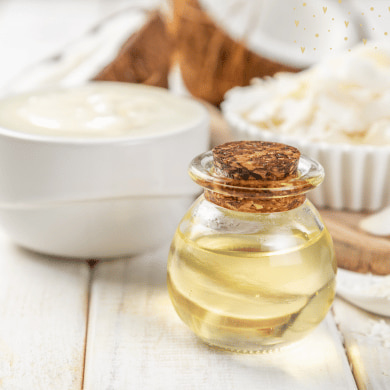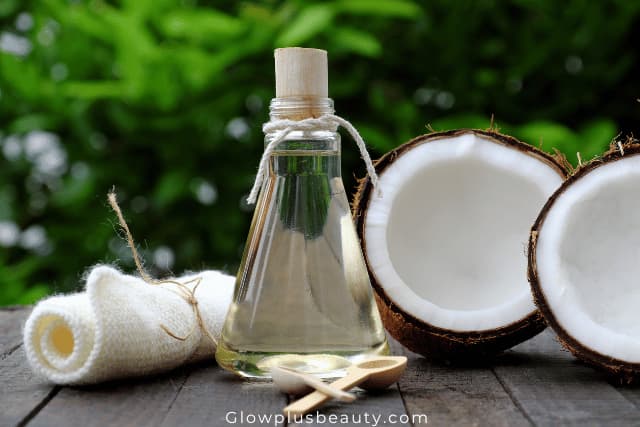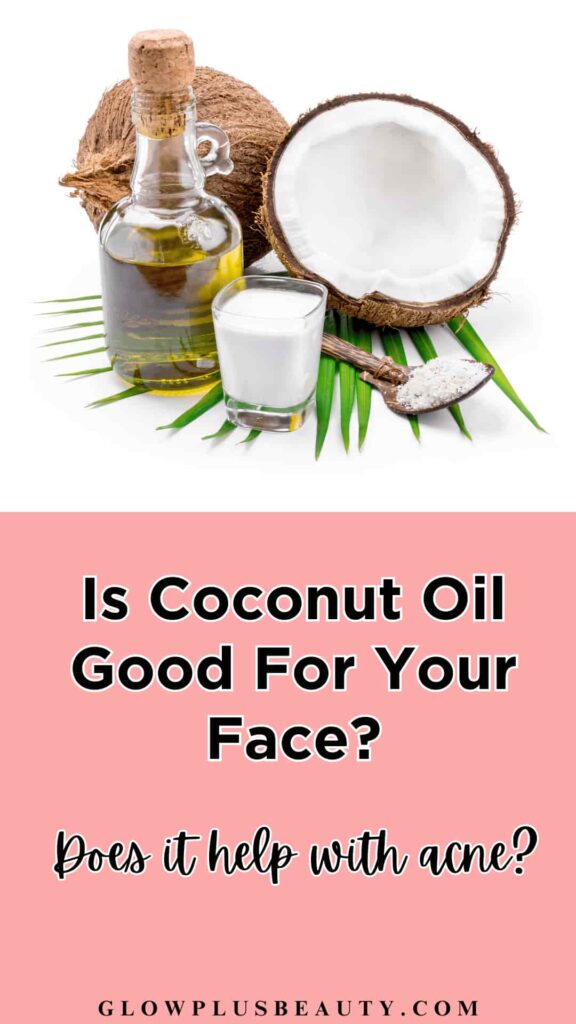
Have you ever wondered if the natural skincare remedies that people rave about are actually worth trying?
Is Coconut Oil Good For Your Face?
Today, I’m diving into a topic that’s close to my heart (and skin): coconut oil.
I’ve been using coconut oil ever since I first discovered its magic, and let me tell you, I’m absolutely obsessed!
From hair care to skincare, it’s my go-to for almost everything. I even use it as a hair oil, and it has worked wonders for me.
So, if you’re curious about whether coconut oil is good for your face, stick around.
I’m here to share all the reasons why this natural elixir should be a staple in your beauty routine.
Coconut oil is one such remedy that has gained immense popularity. It’s often touted as a miracle product for the skin, but is it really beneficial for your face?
In this blog post, we’ll dive into the details of what coconut oil is, its benefits, potential drawbacks, and how to use it on your face.
By the end, you’ll have a clear understanding of whether or not coconut oil is a good fit for your skincare routine.
Check out some posts:
Easy DIY Facials At Home To Try Today (Only Two Ingredients!)
How To Create A Natural DIY Skincare Routine
Lemon Balm Uses, Benefits, And Recipes
What is Coconut Oil?
Coconut oil is simply the essence- extracted from the rich, creamy flesh of coconuts.
This oil is packed with saturated fats, making it solid at room temperature but quick to melt in your hands.
The oil is known for its versatile uses in cooking, hair care, and skincare for a long time.
Types of Coconut Oil
Virgin Coconut Oil: This is obtained from fresh coconut meat, using processes that avoid high temperatures and chemicals. It retains most of the natural nutrients and has a distinct coconut aroma.
It’s ideal for skincare due to its high lauric acid content.
Refined Coconut Oil: This type is made from dried coconut meat, also known as copra. After undergoing refining processes to eliminate impurities, it acquires a milder aroma and taste almost like neutral.
Fractionated Coconut Oil: This oil has had the long-chain fatty acids removed, making it stay liquid even at cooler temperatures. Fractionated oil lacks lauric acid but absorbs quickly.
Is Coconut Oil Good for Your Face?
Coconut oil is packed with antibacterial, antiviral, and antifungal properties, making it a fantastic option for skincare.
Your face is constantly exposed to the elements, more so than any other part of your body. The wind, sun, and other environmental factors can really take a toll on your skin.
However, applying coconut oil to your face can offer a layer of protection against these harsh elements.
Here are some of the top benefits you can enjoy when you use coconut oil on your face:
Benefits of Using Coconut Oil on the Face

Moisturizing Properties
Have you ever had one day where your skin feels like the Sahara Desert?
Coconut oil could be your new best friend. Its super moisturizing properties help lock in moisture, leaving your skin feeling soft and hydrated. It’s perfect for dry patches.
Anti-inflammatory Effects
Coconut oil might offer relief if you struggle with redness or irritation. Its anti-inflammatory properties can help calm your skin down, making it a good option for conditions like eczema or psoriasis.
Antibacterial and Antifungal Properties
Thanks to its high lauric acid content, coconut oil can fight off bacteria and fungi. This means it can help with minor cuts, scrapes, and even acne by preventing infections and promoting healing.
Antioxidant Benefits
Coconut oil is packed with antioxidants, like vitamin E, that protect your skin from free radical damage. Free radicals are those pesky things that contribute to aging, so antioxidants are like your skin’s personal bodyguards.
Healing Properties
Got a minor cut or a small burn? Coconut oil can speed up the healing process. It keeps the area moisturized and protected from infections, helping your skin repair itself more quickly.
Potential Drawbacks of Coconut Oil
Comedogenic Nature
Now, here’s the catch – coconut oil is comedogenic, which means it can clog pores. If you have oily or acne-prone skin, using it on your face might lead to breakouts.
Allergic Reactions
Although it’s rare, some people may have allergies to coconut oil.
If you notice redness, itching, or swelling after using it, stop immediately.
Always do a patch test to ensure safety.
How to Use Coconut Oil on the Face
1. Use Coconut Oil as a Moisturizer
Imagine ending your day with the soothing scent of coconut oil as you wind down.
Coconut oil is a fantastic natural moisturizer that leaves your skin feeling soft and hydrated.
After cleansing your face, take a small amount of coconut oil and gently massage it into your skin.
The oil melts on contact, creating a luxurious experience. It’s perfect for those with dry skin.
2. Use Coconut Oil to Reduce Wrinkles and Fine Lines
Wrinkles and fine lines are a natural part of aging, but coconut oil can help keep your skin looking youthful and radiant.
The antioxidants in coconut oil fight free radicals that cause aging, while its moisturizing properties keep your skin plump and smooth.
Before bedtime, apply a small amount around your eyes, mouth, and forehead.
With regular use, you’ll notice those fine lines becoming less noticeable.
3. You Can Remove Makeup with Coconut Oil
Removing makeup at the end of the day can sometimes feel like a chore, but coconut oil makes it a breeze.
Its natural oils break down even the toughest waterproof makeup without irritating your skin.
Take a small amount and gently massage it onto your face using circular motions.
Watch your makeup melt away! Afterward, wipe it off with a warm, damp cloth. Your skin will feel clean, soft, and moisturized.
Plus, it’s a great way to avoid harsh chemicals found in many commercial makeup removers.
4. Use Coconut Oil as a Face Mask
Pampering yourself with a face mask is one of the best self-care rituals, and coconut oil can elevate this experience.
Mix coconut oil with other natural ingredients like honey, turmeric, or oatmeal to create a nourishing face mask.
As you relax, the mask works its magic, deeply moisturizing your skin and giving it a healthy glow!
Who Should Avoid Using Coconut Oil?
Skin Types
- Oily Skin: Those with oily skin should be cautious, as coconut oil can clog pores and lead to breakouts.
- Acne-Prone Skin: It’s best to avoid using coconut oil if you are prone to acne, as it can exacerbate the condition.
- Sensitive Skin: People with sensitive skin should perform a patch test to ensure they don’t react negatively to coconut oil.
Expert Opinions on using coconut oil on the face
Dermatologists are often divided on coconut oil’s benefits for the face. Dr. Linda Stein Gold, a dermatologist, suggests that while coconut oil can be a great moisturizer for dry skin, it might not be suitable for everyone.
Especially those who have acne-prone or oily skin.
Final Thoughts: Is Coconut Oil Good For Your Face
Coconut oil has numerous benefits for the face, including moisturizing, anti-inflammatory, antibacterial, and antioxidant properties.
However, it’s not without its drawbacks, particularly its potential to clog pores and cause allergic reactions.
It’s essential to consider your skin type and perform a patch test before incorporating coconut oil into your skincare routine.
Have you tried using coconut oil on your face?
Feel free to share your experiences or ask questions in the comments section below. We’d love to hear from you!
Pin this image for later:

FAQs: Is Coconut Oil Good For Your Face?
1. Can I use coconut oil on my face every day?
It depends on your skin type. If you have dry skin, it might be beneficial, but for oily or acne-prone skin, it’s best to avoid it.
2. Is coconut oil safe to use around the eyes?
Yes, but be cautious. It can help reduce wrinkles, but avoid getting it in your eyes.
3. Can coconut oil make acne worse?
Yes, for some people. Its comedogenic properties can clog pores and lead to breakouts.
4. How do I know if I’m allergic to coconut oil?
Perform a patch test by applying a small amount to your inner arm and wait 24 hours to see if there’s any reaction.
5. What are some alternatives to coconut oil for skincare?
Alternatives include argan oil, jojoba oil, and rosehip oil, which are less likely to clog pores.



